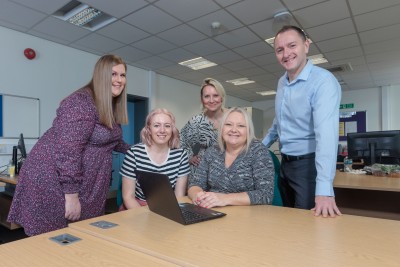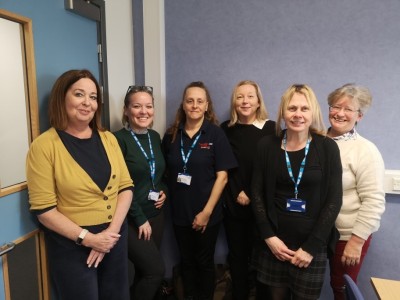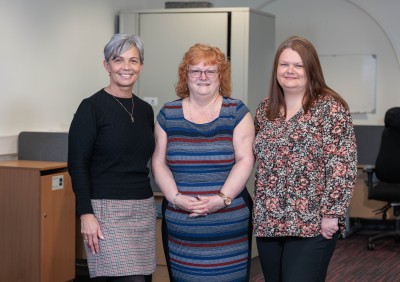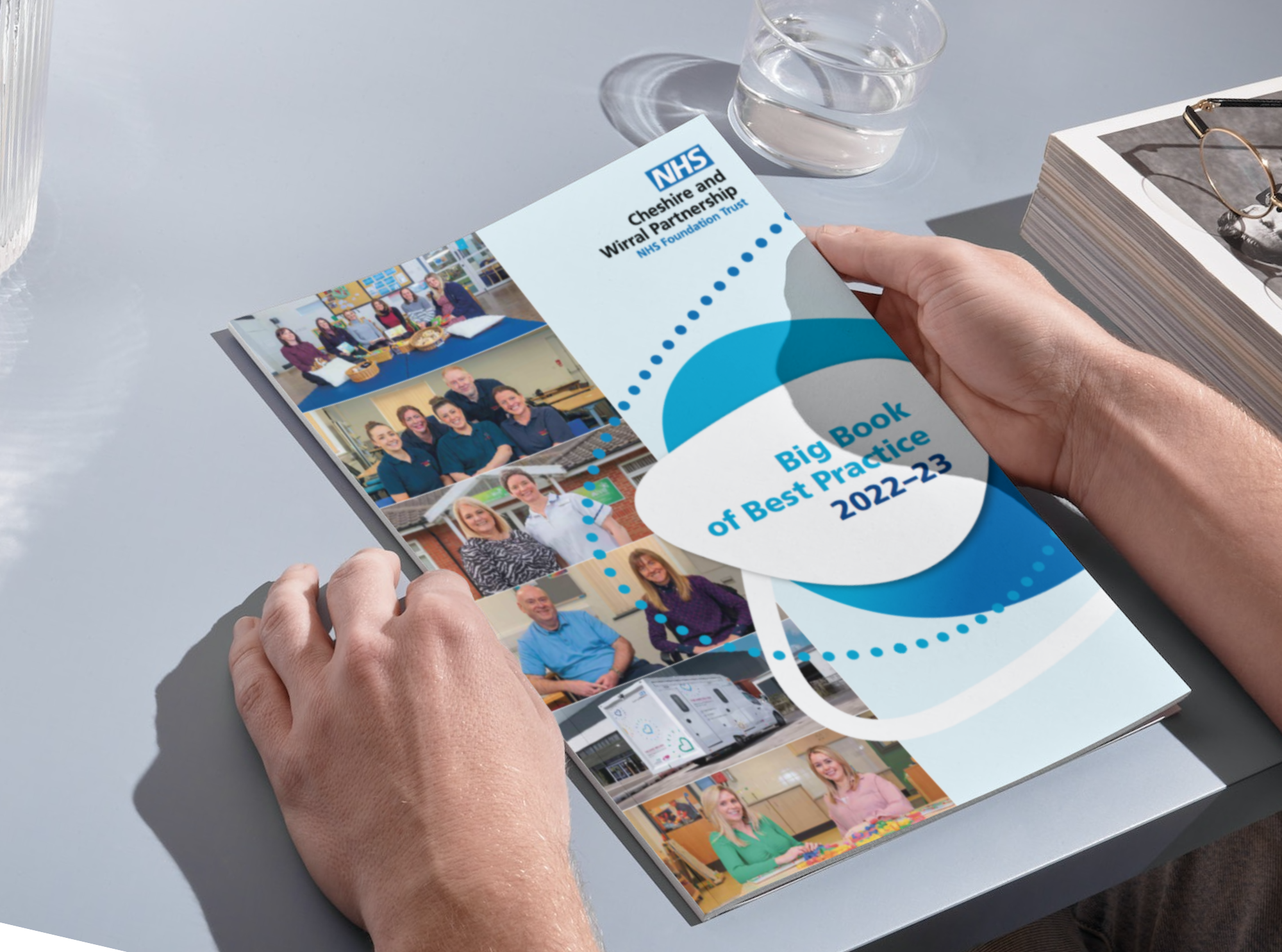Below you can view all the entries that made it into the Big Book of Best Practice 2022-23 from the clinical support services care group.
Contact details for each project can be found within the entries below. For more information about the Big Book of Best Practice, email cwp.
Team: Safe Services / Bangor University / Trust-wide
Contact: beth.

What did we want to achieve?
The overall aim of developing the Clinical Ethics Advisory Group (CEAG) was to integrate ethical considerations into care delivery as a key means of achieving person-centred care and improve safety and quality. Key objectives included sharing how ethical considerations can be at the heart of every patient’s journey to receiving the best care possible, by providing independent scrutiny to vulnerable people with complex needs.
What we did
Members of the CEAG were recruited from different areas and include the Lead Patient Safety Specialist, lay people, research staff from Bangor University and senior health and social care staff from CWP. CEAG developed terms of reference to outline its purpose and consideration of clinical staff and the organisation’s responsibilities (eg legal, duty of care). This was developed within CWP in response to the challenges associated with the pandemic and CWP’s Quality Committee endorsed the approach.
Results
CEAG continues to be evaluated independently and formally by Bangor University, and it is also evaluated internally within CWP by the Lead Patient Safety Specialist, reporting to the Clinical Practice and Standards Sub-committee and Quality Committee. Findings to-date have been qualitative data supporting that clinical staff have found the CEAG to be beneficial in improving confidence, decision-making, critical thinking and critical questioning, as well as patient, family and carer experience. Documentation relating to the rationale for actions taken in the patients’ records has also improved. All cases discussed have followed either the majority or all of the advice provided by CEAG, leading to the safest option for patients’ care and treatment being achieved, whilst improving person-centred outcomes.
Next steps
CWP has an opportunity to share the positive outcomes of CEAG throughout the NHS. The plan is to share outside of CWP after the ongoing learning has been identified, which continues to take place through CEAG. CWP has followed a Plan, Do, Study Act (PDSA) continuous improvement cycle since February 2021 and it is anticipated that the information developed could be shared as part of an implementation toolbox. The sharing of the impact and evaluation of CEAG will extend to the wider Cheshire and Merseyside Integrated Care System moving forward.
Team: Workforce Wellbeing Service and Human Resources
Contact: karen.
What did we want to achieve?
The aim was to ensure anyone affected directly or indirectly by menopause issues at CWP are supported by the organisation, and where appropriate, adjustments put into place.
What we did
Workforce Wellbeing Service (WWS) and Human Resources (HR) team worked collaboratively to produce an evidence-based, user friendly policy for both staff and managers, also using anecdotal experiences from recent cases presented to both services, along with expert advice from a consultant clinical lead in sexual health.
The WWS occupational health pathway manager and HR business partner worked together to produce the policy. Once formally agreed and ratified, a launch was planned, supported by the Communications, Marketing and Public Engagement team, consisting of an external expert in menopause issues and consultant lead in sexual health facilitating two menopause webinars, which were well-attended by CWP staff. One webinar was specifically for line managers and the other for anybody affected by the menopause.
These webinars are still accessible on the WWS intranet pages. Following on from the webinars, a menopause network support group has been set up and feedback has been overwhelmingly positive. This is facilitated by the WWS team and HR colleagues have been in attendance, which has proved invaluable during the group support sessions.
Results
Everyone who attended the webinars and support group has been asked for feedback and this is being collated, to see how helpful these have been and what other things people would like to see covered in the future. One of the requests already actioned is for menopause expert guest speaker to return to facilitate a follow up webinar, which will also look at the benefits people have experienced from having the policy and support group in place.
Next steps
- Follow up webinars with guest expert speakers.
- Continuation of support groups, including outside of office hours to allow for attendance by staff who struggle to attend the group.
- Guest speakers in the support group.
- CWP wellbeing champions specialising in menopause advice and trained accordingly.
Team: Practice Education Team
Contact: joanne.

What did we want to achieve?
Clinical placements and the opportunity to apply theoretical knowledge within a clinical setting are essential for the development of student nurses’ clinical competence, as well as the complex combination of knowledge, skills, values and attitudes required in their future qualified roles. It is also widely acknowledged that student nurses are more likely to seek employment within practice areas where they have had a positive learning experience. However, the COVID-19 pandemic had a significant impact on placement provision and capacity. The aim of the Practice Education Team was to review the placement circuit and increase the number of placements facilitated to the levels seen prior to the pandemic.
What we did
- Conducted an in-depth review of placement capacity.
- Undertook an informal evaluation of the virtual placement activities provided during the pandemic.
- Worked with clinical teams to review any changes to the team and patterns of working.
- Purchased 85 laptops to provide to students to ensure continued access to online learning activities and to enable remote working, where applicable.
- Implemented weekly team meetings to facilitate a proactive approach and assist the team to address any issues in a timely manner.
Results
The activities of the Practice Education Team have not only regained the number of placements facilitated within the Trust, but they have resulted in an increase in placement capacity from the 2019 figures – see below table.
| Year | Number of students | Number of hours | Difference from 2019 figures +/- students / hours |
| 2019 | 462 | 126,090.25 | |
| 2020 | 335 | 83,000.05 | -127 students / -43,090.2 hours |
| 2021 | 461 | 131,180.05 | -1 student / +5,089.8 hours |
| 2022 | 532 | 145,146.20 | +70 students / +19,055.95 hours |
Next steps
The team will continue to support clinical staff and students to maximise the benefits of high quality clinical practice placements. The aim is to improve the variety of learning activities available online to complement student nurses’ development of their competencies within clinical placements. Additionally, this year will see the piloting of an alternative model for student nurses’ clinical placements, which aims to promote a collaborative learning environment through coaching and peer-to-peer support.
Team: Mental Health Law (MHL) team
Contact: jan.

What did we want to achieve?
Historically, the Mental Health Act has been enacted through paper forms. Legislative updates have enabled the use technology to reduce the longstanding risks associated with paper forms and to save time for professionals. The use of technology has many benefits, including providing secure access to forms on any device and reducing risk of lost forms, as well as reducing unlawful detentions due to in-built security measures.
What we did
A proposal was agreed to pilot a new software product from a company called Thalamos in Cheshire West. Cheshire West approved mental health practitioners (AMHPs) agreed to join the pilot and data protection impact assessments were completed. The pilot was rolled out in Cheshire West, with training provided by Thalamos and a quality improvement (QI) project undertaken. Based on evidence from the QI project, a successful bid for funding from Health Education England enabled CWP to invest in Thalamos and plan a Trust-wide roll-out.
Results
- Approximately 30 minutes of clinical time saved when the MHL team accept and process a set of section papers.
- Administrative burden on ward staff is removed, who previously would have had to check and accept paperwork, scan and then email to the MHL team.
- The number of Section 15 amendments has dramatically reduced due to in-built checks.
- No unlawful detentions were recorded where forms were completed on Thalamos.
- Time was saved due to a reduction in reported incidents regarding MHA paperwork.
- MHA paperwork was uploaded to the patient electronic record speedily to ensure evidence of a legal framework and associated actions was available.
Next steps
Thalamos has been rolled-out Trust-wide within the specialist mental health care group. Initial process mapping is regularly reviewed and updated to ensure learning is embedded and improvements made to the process. This is shared with professionals via guidance and support from Thalamos and the MHL Team.
Thalamos is currently being introduced to the children, young people and families care group and the learning disabilities, neuro-developmental and acquired brain injury care group, with process mapping being undertaken specific to the needs of their services.
The MHL team manager is a member of the Thalamos Strategic Group to drive forward improvements to the system, share experiences and learn from other Trusts. An updated version of Thalamos is currently being developed to incorporate feedback given by users and CWP has been asked to take part in an exercise to test the improvements once completed.
Honorable mentions
With nearly 100 entries received for the Big Book of Best Practice 2022-23, we have unfortunately been unable to include every entry in the final book. However, many of the projects – despite not being selected for full publication – deserve to be celebrated for the fantastic outcomes achieved.
You can view the honorable mentions for the clinical support services care group below:
- Pharmacy - Ensuring the safe and appropriate provision of avian flu chemoprophylaxis in Cheshire West
